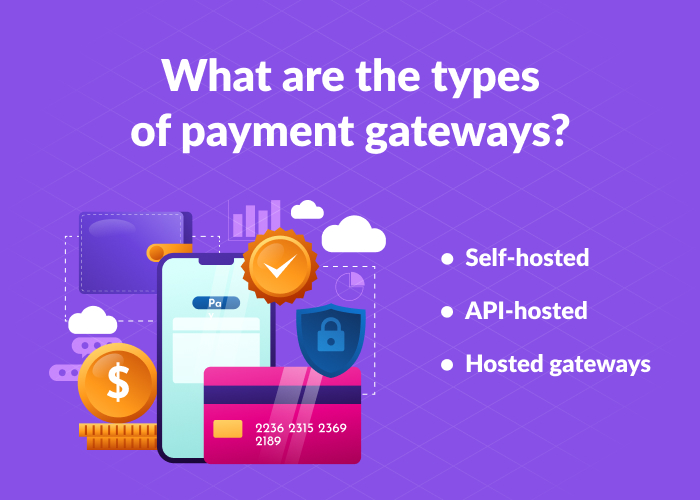What are the types of payment gateways?

Three categories of payment gates are there which are mentioned below.
1. Self-hosted – Payment gateways that are hosted on the merchant’s servers and forward data to an external payment Address for processing and authentication are known as self-hosted payment platforms. This offers the retailer greater command over the customer’s payment process.
2. API-hosted – Because they offer the merchant total control over the purchasing and payment process, retailers of all sizes are drawn to API-hosted payment gateways. However, because their servers will be storing every customer’s payment information, retailers must comply with PCI DSS.
3. Hosted gateways – When a consumer is sent from the website of the seller to the payment processing site, this is known as a hosted payment gateway. The transaction will happen over this hosted gateway. For businesses that lack the resources to fulfill the security requirements of hosting the payment gateway on their server, hosted gateways are a suitable solution. However, this also means that the merchant’s ability to influence the customer’s payment experience is diminished. In addition, it takes the customer away from the merchant’s website and increases the transaction time. However, in order to protect the transaction and the customer data, these compromises are required.
How to build a payment gateway?
- Gathering info: You should determine the business goal you hope to achieve with your payment gateway before moving forward with having it constructed. Prior to constructing the gateway, you should also identify your target demographic and carry out extensive research. After this is finished, you can start developing the product.
- Infrastructure: This includes building the systems and networks required to process, authorize, and settle payments securely. This is the main part and should be developed by a reputed app development company. Furthermore, it should be detecting Fraud.
- Certifications and licenses: There is a lot of compliance involved in creating a gateway for payment. Therefore, the required compliance certificates must be secured before releasing your product onto the market.
- Integration and Launch: Thereafter, the gateways must be integrated with the payment processing platform. After testing, it is launched.
What are the features to include in a payment portal?
- Payment methods: The days of the sole digital payment options being credit and debit cards are long gone. Customers now expect retailers to accept most, if not all, of the digital payment options that have become popular, such as mobile wallets. Thus, more payment methods should be included like crypto, wallet, vouchers, etc.
- Stability: Since digital payment portals must run continuously for 365 days a year, any outage is greatly disregarded. The application must be stable and scalable to handle the load.
- Real-time transactions: Businesses and retailers are becoming more and more interested in solutions that provide real-time settlement. When developing a payment portal, aim to determine the most effective method for enabling instantaneous payments while maintaining security.
- User-friendly UI/UX: Furthermore, make sure that all of the expected customers can easily navigate around it.
- Support for numerous currencies: Since digital transactions are not geographically restricted, users of the payment portal may come from a variety of nations. For this reason, consider developing a multi-currency gateway in order to maximize its accessibility.
Conclusion
To sum up, payment gateways are essential to the smooth and safe operation of Internet transactions. Depending on the target market and operational needs, businesses may pick from a wide range of choices, including digital wallets, cryptocurrency gateways, and traditional credit card gateways. We can expect more advancements in payment solutions as technology develops, with a focus on better user experiences, more security, and wider worldwide accessibility.
FAQs
What is a payment gateway?
How does a payment portal ensure security?
Are there any transaction fees associated with payment gateways?
Can payment gateways process international transactions?
What is the role of payment gateways in mobile payments?
Shivangi is a passionate Copywriter at Alian Software with expertise in technical copywriting. She shares information that is easy to understand regarding business, technology, and trends.